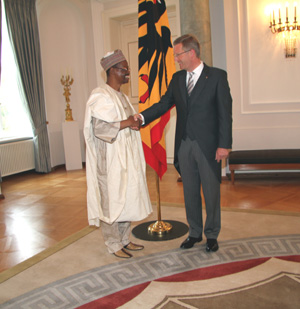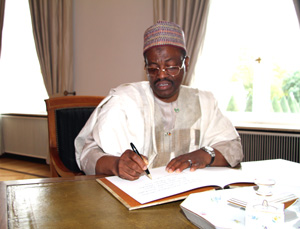
After taking ceremonial salute by a detachment of the German Marines (Navy), Ambassador Abubakar signed the official Guest Book and was ushered in by officials of the German Foreign Ministry and the Presidential Office to the Presidential Suite where he was received by the president.
President Wulff and Ambassador Abubakar later met behind closed doors for discussions belived to centre on bilateral relations between Germany and Nigeria, regional as well as international issues.
Bilateral relations between the two countries gained momentum following the end of military rule in Nigeria in May 1999. The most recent high point in relations were the Fourth Africa Forum held in Abuja in November 2008 as part of Federal President’s Partnership with Africa initiative, and the subsequent official visit by President Horst Köhler and his wife.
The series of high-level visits between Germany and Nigeria, which began with President Olusegun Obasanjo‘s official visit to Germany in December 1999, gained greater momenmum under the government of President Yar’Adua. In June 2007, Federal Chancellor Angela Merkel invited President Yar’Adua, shortly after he had taken office, to attend the G8 Summit in Heiligendamm. Further bilateral meetings led to the agreement being reached on a German-Nigerian Energy Partnership in 2008.
Economic relations
On the economic front, the two countries have met regularly to promote joint projects, notably in the energy sector – focussing on the rehabilitation and further development of electricity prodution in Nigeria – including the use of renewable energy, as well as promoting greater involvement of German firms in tapping energy sources in Nigeria.
Interest among entrepreneurs is growing on both sides in other sectors as well.

The mail German exports to Nigeria are machinery, vehicles, chemical products and electrical goods.
Some 50 German companies operate in Nigeria, some with production plants, others with offices. The agreement on reciprocal investment protection and promotion, which was signed in 2000, entered into force in September 2007.
Development co-operation
Bilateral development co-operation was suspended during the Abacha dictatorship, with only projects in progress continuing until completion. Nigeria’s return to democracy in 1999 paved the way for a resumption of c-operation with Germany and other former donor countries. As one of Germany’s partner countries in development co-operation, the new priority in Technical Co-operation with Nigeria is the employment-oriented promotion of micro, small and medium-sized businesses in the federal states of Niger, Nasarawa and Plateau. Since the end of 2004, the German government has reallocated a total of 35 million euro in previous commitments under Financial Co-operation to support a programme to combat poliomyelitis. An additional 1.5 million from the Study and Expert Funds was reallocated to finance the project Promoting Women’s and Girl’s Rights in Borno State.
Since development co-operation began, Germany has pledged funds worth more than 360 million euro to Nigeria, two-thirds of which was earmarked for Financial Co-operation and one-third for Technical Co-operation.
Mellisa Sheridan, ANA Diplomatic Editor &
Musah Ibrahim Musah
